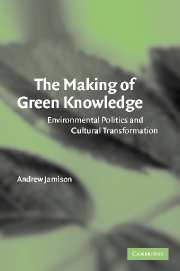Book contents
- Frontmatter
- Dedication
- Contents
- Tables
- Acknowledgments
- Introduction
- 1 On the ambiguities of greening
- 2 Social movements and knowledge-making
- 3 The dialectics of environmentalism
- 4 National shades of green
- 5 The challenge of green business
- 6 On the dilemmas of activism
- 7 Concluding reflections
- References
- Index of Names
2 - Social movements and knowledge-making
Published online by Cambridge University Press: 22 September 2009
- Frontmatter
- Dedication
- Contents
- Tables
- Acknowledgments
- Introduction
- 1 On the ambiguities of greening
- 2 Social movements and knowledge-making
- 3 The dialectics of environmentalism
- 4 National shades of green
- 5 The challenge of green business
- 6 On the dilemmas of activism
- 7 Concluding reflections
- References
- Index of Names
Summary
It’s where the rivers change direction …
Kate Wolf, “Across the Great Divide” (1980)Radical movements may be understood as schools – from which the students graduate not quite the same as when they entered. They also, of course, affect and influence far more persons than their members.
Norman Birnbaum, The Radical Renewal (1988: 140)From movements to institutions
It is one of the underlying arguments of this book that the political quest for sustainable development is best thought of as an ongoing series of cultural transformations by which the visionary ideas and utopian practices of the environmental movement are working their way into the social lifeblood. From this perspective, the ever more cooperative, or “constructive,” roles that many environmental organizations and former activists have taken on can be said to represent a transition from movement to institution, as ideas and activities that were previously considered radical or alternative are now being translated into more acceptable forms (Eder 1996). As the environmental “movement” has come to be redefined, however, and, in the eyes of many, reduced primarily to the machinations of large, “non-governmental” organizations such as Greenpeace and the World Wildlife Fund, something rather fundamental seems to have changed. In the process of winning influence and organizational strength the messages that are being projected and the activities that are being carried out have been transformed in subtle ways.
- Type
- Chapter
- Information
- The Making of Green KnowledgeEnvironmental Politics and Cultural Transformation, pp. 45 - 70Publisher: Cambridge University PressPrint publication year: 2001

